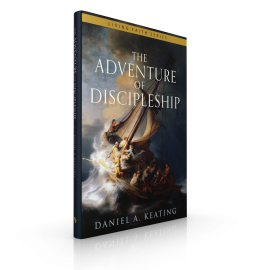By Daniel Keating
Daniel Keating is Professor of Theology at Sacred Heart Major Seminary in Detroit, Michigan, where he teaches on Scripture, the Church Fathers, Ecumenism, and the New Evangelization. He is the author of The Adventure of Discipleship.

We live in a world deeply hungry, even desperate, for friendship. But it seems that true friendship remains in short supply. We now have multiple social networking sites where people can claim “friends” by the hundreds, but these same people report being lonelier than ever. It is not difficult to see why. Social networking can be a fine way to keep in touch with friends or to pass along information, but it simply does not serve well as a vehicle for making real friends or deepening true friendship. Christine Rosen explains why she thinks this is so:
But “friendship” in these virtual spaces is thoroughly different from real-world friendship. In its traditional sense, friendship is a relationship which, broadly speaking, involves the sharing of mutual interests, reciprocity, trust, and the revelation of intimate details over time and within specific social (and cultural) contexts. Because friendship depends on mutual revelations that are concealed from the rest of the world, it can only flourish within the boundaries of privacy; the idea of public friendships is an oxymoron.
As we shall see, having groups of friends or even communities of friends is entirely possible, but this involves more than gathering up hundreds of friends online. If we take short-cuts on the road to friendship we will fail to gain the real thing and its counterfeits will only leave us more desperately lonely and vulnerable than before.
Our hunger for authentic friendship is not a sign of weakness or immaturity; it is part of being human. If the wisdom of the wise can be trusted, friendship is one of the greatest “goods” that humans can experience. Aristotle (fourth century BC) concludes that “the man who is to be happy will therefore need virtuous friends.” Aelred of Rievaulx (twelfth century) states that “scarcely any happiness whatever can exist among mankind without friendship.” A contemporary Catholic psychiatrist, Ignace Lepp, reckons that “friendship represents one of the most precious values of the human condition. It is certainly worth the effort to commit ourselves courageously to the experience of friendship.”
If friendship is centrally important to discipleship—and I believe that it is—then this shows that Christian discipleship requires and thrives in a communal context. We are not lone Christians walking a solitary pilgrimage of faith. Rather, we are banded together with other companions in a common pilgrimage, serving together, fighting together against a common foe, and helping each other along the way. Crucially, this friendship is not merely instrumental; it is not something that simply helps us make progress on the path, like a bicycle or a golf cart. The goal and end of eternal life is communion (koinonia) with God and with one another. Our friendships here in this life are the training-ground and foretaste of the friendship that will be ours eternally. Christian discipleship at its core is also a school of friendship.
So, what is friendship? Friendship is a great gift that is meant to characterize our common pilgrimage. True friends aim for each other’s good. They join in common interests and grow together in unity and likeness. They love one another but are glad to see their friendships extend to others. They pursue a common good and help one another grow in a life of virtue and holiness.
You Might Also Like
 Jesus tells us that to be his disciple we must surrender everything and, with his grace, brave the path provided for us by God. Such a sojourn will surely be marked by joy, suffering, uncertainty, and—above all—adventure. In The Adventure of Discipleship, discover the incredible story that is friendship with Christ.
Jesus tells us that to be his disciple we must surrender everything and, with his grace, brave the path provided for us by God. Such a sojourn will surely be marked by joy, suffering, uncertainty, and—above all—adventure. In The Adventure of Discipleship, discover the incredible story that is friendship with Christ.